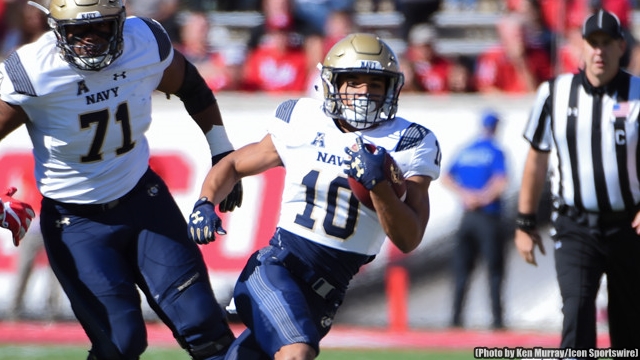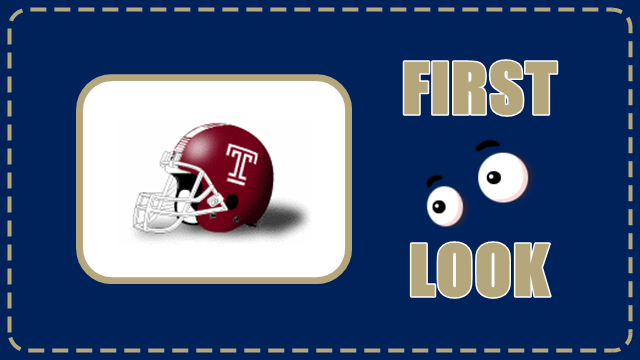
There are certain things Americans can count on, no matter how much the rest of the world changes. Nick Saban won’t smile. The College Football Playoff weekly rankings shows will get a lot of people riled up.
Your NCAA Tournament bracket will be damaged by the end of the first weekend, if not by the end of the first round.
A Canadian team won’t win the Stanley Cup.
Prominent black quarterbacks will be a focal point of NFL Draft commentary and analysis.
The other AFC East teams in the New England Patriots’ division will make personnel decisions which remind everyone else why no one has challenged the Patriots in 627 years.
Service academy teams don’t commit many penalties, at least not “mental” ones, as opposed to “physical” penalties such as holding penalties against larger defensive linemen from programs such as Ohio State or Alabama.
Service academy football owns many joys, one of them being the evident discipline on display. Fumbles and ball security are separate in the sense that they are responses to hard hits or chaotic developments on a play. Getting physically punished often leads to lost fumbles — it is true that good discipline and secure ballhandling go hand-in-hand, but those are still physical mistakes to a certain degree. The one thing academy teams consistently avoid doing in any season: Making the bad mental error, the false start being the foremost example. Army, Air Force and Navy simply don’t do that.
Last December’s Army-Navy Game marked an exception… and that exception came at the worst possible time for Navy.
The Midshipmen’s 14-game winning streak over Army ended in 2016, when the Black Knights put together a game-winning fourth-quarter drive. Navy was trying to return the favor last year, and it appeared that the Midshipmen were going to succeed when they moved deep into Army territory, down 14-13 in the dying moments of regulation.
Then came not one, but two, false starts. Two unexpected, unforced mistakes turned a moderately manageable field goal attempt into a long and difficult one in the Philadelphia snow. Bennett Moehring’s kick from 48 yards was very well struck. It had more than enough distance in the miserable conditions. It easily would have been good from 38 yards out, and it would have snuck inside the left upright if the kick had been from 43 yards. From 48, though, the distance in the air was substantial enough to cause the ball to drift just wide of the goalpost. Army won back-to-back games against Navy for the first time this century.
The occurrence was as rare as Navy committing two false starts in scoring territory on a last-minute drive.
The 2017 Navy season started 5-0 and appeared to be yet another campaign with at least eight regular season wins for Ken Niumatalolo and Company. Tossing out the 2-10 2002 season in which Paul Johnson inherited a mess from Charlie Weatherbie and needed one year to find his bearings, Navy has rarely struggled. From 2003 through 2016, Navy failed to make a bowl game just once, in 2011. In that same 14-season period, the Midshipmen failed to win eight games in the regular season only three times: 2005, 2011, and 2014. That’s how high Johnson and Niumatalolo have set the bar in Annapolis. Not winning eight games in a regular season is the rarity rather than the norm for Navy in the 21st century.
The 2017 team, after that 5-0 start powered by close and exhilarating wins over Tulane and especially Air Force, plus a strong second-half comeback against Tulsa on the road, simply lost the plot. It wasn’t anticipated, but it happened. The worst thing about the losses beyond the results themselves is that Navy’s defense played more than well enough to win games. Navy held Memphis’s high-powered attack (on the road) to 30 points. Houston scored only 24 in a home game versus the Mids. UCF — the team which went unbeaten last season and has claimed a national title — scored only 31 on Navy. Notre Dame, also playing at home, posted only 24 points against the Midshipmen. Army scored only 14, but it was somehow enough. Coordinator Dale Pehrson got the most out of his group. In the Keenan Reynolds era or in Will Worth’s special 2016 season, Navy’s defensive performance — married with the offense’s output — would have led to at least nine wins if not 10.
In 2017, it led to a 6-6 regular season, marking just the second time since 2003 that Navy has failed to produce a winning regular season.
For whatever reason, the discipline commonly associated with service academy football did not exist for the Midshipmen last year. Given that Navy has been the best academy program this century, the failure to exhibit basic discipline represents even more of a disappointment. That’s what the 2018 team must correct more than anything else.
When the 2011 season went off the rails, the reality was very similar for Navy. Call it the laws of averages — you’re not going to be sharp all the time — or a product of deficient chemistry. Regardless, Navy didn’t put the pieces together that year. The plays Navy has so reliably made in 15 years of Johnson-Niumatalolo football simply didn’t emerge that season, and they similarly didn’t in the back end of the 2017 campaign.
There is no need for an overhaul or a rethinking of any philosophies. None. This is all about attention to small details and reestablishing the commitment to precision which has put Navy on the right side of its margin for error on a consistent basis.
The Midshipmen should be very encouraged by their quarterback situation in 2018. Malcolm Perry is an explosive athlete whose performances against Army and (in the Military Bowl) Virginia should give Niumatalolo and offensive coordinator Ivin Jasper every expectation that this offense can restore itself. Moreover, if — akin to 2016 with Tago Smith — Perry gets injured, Zach Abey can capably fill in as the backup. He would have the live reps Will Worth lacked at the start of 2016, so if anything, this situation (which is not an exact parallel to 2016) is actually BETTER than Navy’s situation two years ago.
Pehrson’s able stewardship of the defense last season shows that the torch has been passed to a very capable successor for Buddy Green. Navy’s defense will not have to be spectacular if the offense can steadily perform and recall its pre-2017 excellence. Navy’s defense will merely need to come up with the timely cluster of important plays which turn opponents’ touchdown drives into field goals and fourth-down conversions into turnovers on downs. The offense is clearly the focus of the 2018 team.
As long as there are no false starts for Navy in its 2018 execution of the triple-option offense, the Midshipmen will not be ambushed by false hopes. It’s time for Navy to once again become — and deliver — the truth to its service academy rivals, plus its foremost AAC West Division foes.
With a 21st-century version of Commodore Perry under center, Navy is in position to regain the high seas in the AAC and the Commander-in-Chief’s Trophy series. If Malcolm’s teammates are ready to restore the attention to detail which has made Navy football so formidable since 2003, there is every reason to expect that Navy — which won at least eight regular season games in four of the next five seasons following its 2011 debacle — can similarly rebound after 2017’s wobbly steps.



